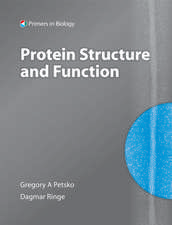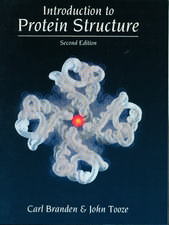Protein Engineering and Design
Editat de Sheldon J. Park, Jennifer R. Cochranen Limba Engleză Paperback – 24 iun 2024
Experimental Protein Engineering
The first half of the book discusses experimental approaches to protein engineering and starts by describing several high-throughput screening platforms for protein engineering. Key techniques used for diversity generation are also discussed. The next few chapters present examples of therapeutics, enzymes, biomaterials, and other proteins that have been engineered by rational or combinatorial approaches. The section finishes with a chapter on the use of non-natural amino acids in protein engineering.
Computational Protein Design
The second half of the book introduces computational protein design, beginning with a chapter on computational and informatics algorithms used in protein engineering. Core components of computational protein design are then discussed in detail, and examples of heuristic protein design are provided. Subsequent chapters present examples of how computational design has played a critical role in advancing the field of protein engineering. Concluding with a chapter outlining current challenges in the field, this book makes computational protein design and diversity-oriented protein engineering widely accessible to a broad audience in academia and industry alike.
| Toate formatele și edițiile | Preț | Express |
|---|---|---|
| Paperback (1) | 313.18 lei 6-8 săpt. | |
| CRC Press – 24 iun 2024 | 313.18 lei 6-8 săpt. | |
| Hardback (1) | 1337.26 lei 6-8 săpt. | |
| CRC Press – 25 sep 2009 | 1337.26 lei 6-8 săpt. |
Preț: 313.18 lei
Preț vechi: 375.35 lei
-17% Nou
Puncte Express: 470
Preț estimativ în valută:
59.94€ • 62.34$ • 49.48£
59.94€ • 62.34$ • 49.48£
Carte tipărită la comandă
Livrare economică 12-26 aprilie
Preluare comenzi: 021 569.72.76
Specificații
ISBN-13: 9781032836683
ISBN-10: 1032836687
Pagini: 432
Ilustrații: 113
Dimensiuni: 156 x 234 x 30 mm
Greutate: 0.8 kg
Ediția:1
Editura: CRC Press
Colecția CRC Press
Locul publicării:Boca Raton, United States
ISBN-10: 1032836687
Pagini: 432
Ilustrații: 113
Dimensiuni: 156 x 234 x 30 mm
Greutate: 0.8 kg
Ediția:1
Editura: CRC Press
Colecția CRC Press
Locul publicării:Boca Raton, United States
Public țintă
ProfessionalCuprins
Phage Display Systems for Protein Engineering. Cell Surface Display Systems for Protein Engineering. Cell-Free Display Systems for Protein Engineering. Library Construction for Protein Engineering. Design and Engineering of Synthetic Binding Proteins Using Nonantibody Scaffolds. Combinatorial Enzyme Engineering. Engineering of Therapeutic Proteins. Protein Engineered Biomaterials. Protein Engineering Using Noncanonical Amino Acids. Computer Graphics, Homology Modeling, and Bioinformatics. Knowledge-Based Protein Design. Molecular Force Fields. Rotamer Libraries for Molecular Modeling and Design of Proteins. Search Algorithms. Modulating Protein Structure. Modulation of Intrinsic Properties by Computational Design. Modulating Protein Interactions by Rational and Computational Design. Future Challenges of Computational Protein Design.
Notă biografică
Sheldon Park holds a B.A. in math and physics from the University of California (Berkeley), an M.S. in physics from Massachusetts Institute of Technology, and a Ph.D. in biophysics from Harvard University. He studied protein engineering and design while working as a postdoc for Dr. Jeffery Saven and Dr. Eric Boder at the University of Pennsylvania. Since 2006, he has been a professor of chemical and biological engineering at University at Buffalo. In his research, Dr. Park uses modeling and simulation to analyze protein molecules and uses high-throughput screening to engineer protein molecules of various structure and function. He is particularly interested in developing efficient methods of engineering complex protein molecules with potential biotechnological and biomedical applications.
Jennifer Cochran holds a B.S. in biochemistry from the University of Delaware and a Ph.D. in biological chemistry from Massachusetts Institute of Technology (MIT). She studied and developed combinatorial protein engineering methods while a postdoctoral fellow in the lab of K. Dane Wittrup in the Department of Biological Engineering at MIT. Since 2005, she has been a professor of bioengineering at Stanford University. Dr. Cochran’s laboratory uses interdisciplinary approaches in chemistry, engineering, and biophysics tostudy complex biological systems and to create designer protein therapeutics and diagnostic agents for biomedical applications. She is interested in elucidating molecular details of receptor-mediated cell signaling events and at the same time developing protein and polymer-based tools that will allow manipulation of cell processes on a molecular level.
Jennifer Cochran holds a B.S. in biochemistry from the University of Delaware and a Ph.D. in biological chemistry from Massachusetts Institute of Technology (MIT). She studied and developed combinatorial protein engineering methods while a postdoctoral fellow in the lab of K. Dane Wittrup in the Department of Biological Engineering at MIT. Since 2005, she has been a professor of bioengineering at Stanford University. Dr. Cochran’s laboratory uses interdisciplinary approaches in chemistry, engineering, and biophysics tostudy complex biological systems and to create designer protein therapeutics and diagnostic agents for biomedical applications. She is interested in elucidating molecular details of receptor-mediated cell signaling events and at the same time developing protein and polymer-based tools that will allow manipulation of cell processes on a molecular level.
Descriere
The emerging use of the computational design approach as a means of engineering proteins with novel functions has led to widespread usage of computational analysis in protein engineering at large. However, because the structure and function of protein molecules are coupled at the molecular level, many critical questions are left unanswered and m













